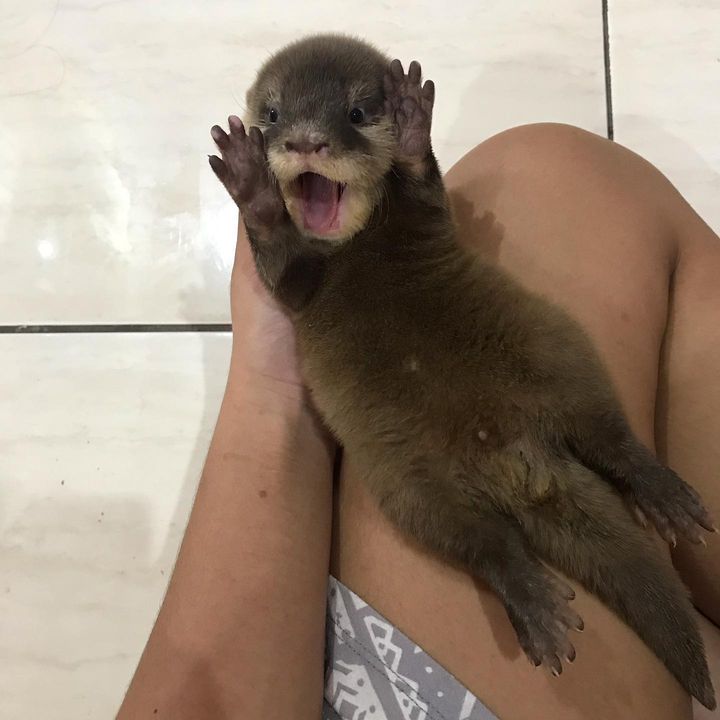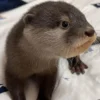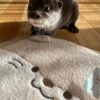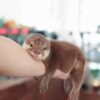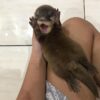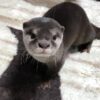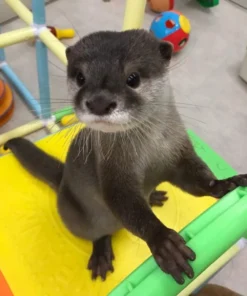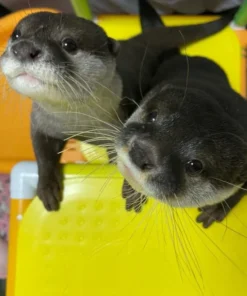$800.00 Original price was: $800.00.$500.00Current price is: $500.00.
Gender: 2 Female, 1 Male
Breed: Otter
Birthday Certificate Available
Full Vet Records Available
Otter For Sale
Asian Small Clawed Otter for sale: A Detailed Guide
The Asian small clawed otters for sale (Aonyx cinereus) is the smallest of all otter species but stands out as one of the most fascinating. These playful, intelligent creatures have captured the attention of wildlife enthusiasts worldwide due to their energetic behavior and unique social dynamics. Native to Southeast Asia, they inhabit wetlands, rivers, and coastal regions, where they thrive in family groups.
If you’re considering owning an Asian small-clawed otter or are just curious about these endearing creatures, this guide provides everything you need to know about them, including where to find baby Asian small-clawed otters for sale and the responsibility that comes with ownership.
What Makes the Asian Small Clawed Otter for sale Special?
Asian small clawed otters are unique not only because of their size but also due to their dexterous nature. These Asian small clawed otters for sale use their paws rather than their mouths to manipulate objects, hunt for food, and interact with their environment. Their highly developed sense of touch, coupled with remarkable intelligence, makes them capable of solving problems and adapting to various environments.
– *Size*: Adult Asian small clawed otters for sale measure between 18 to 24 inches in body length, with tails adding another 10 to 14 inches. They typically weigh between 2 to 6 kg (5 to 13 lbs), making them the smallest otter species.
– *Paws*: Unlike other otters, their claws don’t extend beyond the tips of their toes. This gives them enhanced manual dexterity, allowing them to pry open shellfish or catch prey like crabs, snails, and fish.
– *Lifespan*: In the wild, these Asian small clawed otters for sale can live up to 10 years, but in captivity, with proper care, they may live as long as 15 years.
Natural Habitat and Behavior
Asian small-clawed otters are found in the wetlands and mangrove forests of Southeast Asia, ranging from India to the Philippines. They prefer freshwater environments but can also be found in coastal regions. These otters are highly social, often living in family groups of up to 15 individuals.
– *Family Units* Asian small clawed otters for sale are monogamous, typically pairing for life. They raise their young in close-knit family groups, with older offspring often helping to care for new pups. Their cooperative nature makes them one of the most social otter species.
– *Communication*: Otters communicate through vocalizations, body language, and scent markings. They use squeaks, chirps, and whistles to convey information to their group, creating a complex social structure.
– *Playful Behavior*: These otters are highly active and playful. They spend a significant portion of their day foraging for food and playing with one another. Their social activities often involve mock wrestling, sliding on mud banks, and swimming together.
Caring for an Asian Small Clawed Otter for sale in Captivity
If you’re considering bringing an Asian small-clawed otter into your life, there are several important factors to consider. Otters, while incredibly cute, have specialized care requirements and can be challenging to keep as pets. Before searching for an “Asian small-clawed otter for sale,” it’s essential to ensure you can provide the environment and care these animals need.
### Housing Requirements
One of the primary challenges of owning an otter is providing them with a suitable living environment. Otters are semi-aquatic, meaning they need both land and water to thrive. A large, secure enclosure is necessary to give them space to swim, play, and exercise.
– *Size of the Enclosure*: Otters require a spacious enclosure that includes a swimming area as well as dry land. The enclosure should be at least 20 feet by 30 feet to allow the otter ample space to explore and move around. The pool should be deep enough to swim in and large enough for them to dive, with clean, filtered water.
– *Enrichment*: Otters are highly intelligent and need mental stimulation. Enclosures should include plenty of enrichment, such as toys, puzzles, and natural elements like rocks and logs for climbing. Without proper enrichment, otters can become bored and stressed, leading to destructive behaviors.
– *Temperature and Climate Control*: If you live in an area with colder climates, you may need to provide heating or ensure their habitat is temperature-controlled, as otters are sensitive to extreme weather.
### Diet and Nutrition
In the wild, Asian small clawed otters are primarily carnivorous, feeding on fish, crabs, mollusks, and other small aquatic animals. In captivity, replicating their diet is essential to keep them healthy and happy.
– *Raw Diet*: Asian small-clawed otters require a high-protein diet that includes fresh fish, shellfish, and occasional meat. Variety is important, as otters benefit from different types of prey. You can also offer live or frozen food such as shrimp, crayfish, and other small aquatic creatures to simulate natural hunting behavior.
– *Supplements*: To ensure they get all the necessary vitamins and minerals, many owners provide supplements such as calcium and vitamin D. Consulting with a veterinarian who specializes in exotic animals is important for creating a balanced diet.
– *Feeding Frequency*: Otters need to be fed several times throughout the day to 14 inches. They typically weigh between 6 to 11 pounds, making them the smallest of the 13 otter species. Despite their small size, they are incredibly agile, both on land and in the water.
– *Dexterity*: One of the most remarkable traits of Asian small clawed otters for sale is their use of their forepaws for handling food and objects. Unlike other otter species that rely more on their mouths, these otters use their highly sensitive paws to feel for prey in muddy riverbanks or under rocks, showing exceptional coordination.
– *Social Behavior*: These otters are incredibly social and are known to live in family groups of up to 15 individuals. They are highly vocal animals, using a variety of sounds to communicate with one another. Whether it’s a whistle to call out to group members or a growl to express irritation, their communication skills are complex and sophisticated.
### Habitat and Distribution
Asian small-clawed otters are native to the wetlands and rivers of South and Southeast Asia, including regions of India, China, Indonesia, Malaysia, and the Philippines. They thrive in habitats such as mangrove swamps, rice paddies, marshlands, and slow-moving rivers, where they can easily find prey like crabs, mollusks, and small fish.
Due to their habitat preferences, these otters are highly dependent on clean water sources. Unfortunately, habitat destruction and water pollution have contributed to a decline in their populations in many regions. However, they are still found in significant numbers in protected reserves.
## Baby Asian Small-Clawed Otters: What to Expect
If you’re considering bringing home a baby Asian small-clawed otter, you should be aware that caring for these animals requires a substantial commitment. These otters are not domesticated animals like cats or dogs, and they have specialized needs that are difficult to meet in a typical household environment.
### The Early Life of an Otter
Baby Asian small-clawed otters, often referred to as pups, are born blind, deaf, and completely dependent on their parents. In the wild, they stay in the safety of their dens for the first several weeks of life, nurtured and cared for by both the mother and father. After about 40 days, their eyes and ears open, and they start exploring their surroundings, guided by their family members.
– *Development*: Otter pups begin learning how to swim at around 10 weeks of age, under the supervision of their parents. They are also weaned from their mother’s milk around this time and introduced to solid food, including crabs and small fish.
– *Social Learning*: During their early months, baby otters learn essential survival skills through play and mimicry. They practice catching prey, interacting with their siblings, and understanding the dynamics of their family unit. Social learning is crucial for their development and contributes to the close-knit family bonds that Asian small-clawed otters are known for.
### Housing a Baby Otter
While it may seem enticing to look for a “baby Asian small-clawed otter for sale,” potential owners need to be aware of the significant space and care requirements these animals need. Otters are semi-aquatic, meaning they need access to both land and water in their living environments. A small enclosure or backyard pond will not be sufficient for these active animals.
– *Water Access*: Since these otters spend a significant portion of their time swimming, a large water feature, such as a pond or swimming pool, is essential. The water must be clean and free from pollutants, as otters are highly sensitive to water quality.
– *Enrichment*: Asian small-clawed otters are incredibly intelligent and need constant mental and physical stimulation. Without enough enrichment, they can become bored, stressed, and even destructive. They need toys, interactive feeders, and the opportunity to explore and forage for food.
## Diet and Nutrition
In the wild, Asian small-clawed otters feed primarily on crustaceans, mollusks, and small fish. They have strong jaws and teeth, allowing them to crack open shells and consume hard-shelled prey. In captivity, their diet must replicate this as closely as possible to ensure their health and well-being.
– *Diet in Captivity*: A captive otter’s diet should include a variety of seafood, such as shrimp, crayfish, crabs, and fish. Some owners also supplement their otters’ diets with high-quality, protein-rich commercial food designed for exotic animals. Calcium supplements are sometimes necessary to promote healthy bone development.
– *Feeding Habits*: Asian small-clawed otters are natural foragers. In captivity, owners can stimulate this behavior by hiding food around their enclosure or providing puzzle feeders that encourage the otters to “hunt” for their meals.
## Legal Considerations: Owning an Asian Small-Clawed Otter
Before you begin searching for “Asian small-clawed otters for sale,” it’s crucial to understand the legalities and responsibilities involved in owning an exotic animal like an otter. While their cute appearance might make them seem like ideal pets, they are wild animals that require specialized care and attention.
### Legal Restrictions
In many places, it is illegal to own an Asian small-clawed otter without the proper permits. These animals are classified as exotic pets, and their ownership is regulated to protect both the species and potential owners. In some countries, it’s entirely illegal to own an otter as a pet, while in others, permits are issued only under strict conditions.
– *Permits*: If you’re looking for an “Asian small-clawed otter for sale,” make sure you thoroughly research the legal requirements in your area. You may need a permit to legally own and care for the otter, and this usually involves proving that you can provide an appropriate habitat and care for the animal’s specific needs.
– *Conservation Concerns*: These otters are listed as vulnerable on the IUCN Red List due to habitat loss, pollution, and hunting. Illegal trafficking of wild otters has also become a significant issue. To avoid contributing to the problem, it’s important to only purchase otters from reputable, legal breeders who follow ethical practices.
### Ethical Concerns
The exotic pet trade has raised many ethical issues, particularly concerning animals like otters that are taken from the wild and sold into captivity. Many of these animals are illegally captured, leading to a decline in wild populations. Additionally, captive environments often fail to meet the complex needs of these animals, leading to stress and health problems.
– *Wildlife Conservation*: Rather than owning an otter as a pet, consider supporting wildlife conservation efforts that aim to protect otter populations in the wild. Donations to conservation organizations, sponsorship programs, and visiting responsibly managed zoos and sanctuaries are all ways to enjoy these animals while contributing to their preservation.
## Social and Behavioral Needs
Asian small-clawed otters are highly social animals, and they thrive in groups. In the wild, they live in extended family units, with parents, siblings, and sometimes unrelated individuals working together to care for the young and defend their territory. This social structure is a key part of their well-being, and it’s difficult to replicate in captivity.
### Loneliness and Stress
If you are considering owning an otter, keep in mind that a single otter may experience loneliness and stress without the presence of others. Their natural behaviors, such as grooming, play, and vocal communication, are all based on social interaction. In captivity, the lack of these interactions can lead to depression, anxiety, and destructive behavior.
– *Group Living*: For those dedicated to owning otters, it’s essential to consider having more than one. Providing a companion can reduce stress and allow for the social interactions that otters crave.
– *Enrichment and Interaction*: Owners need to engage with their otters frequently, offering games, training, and activities that stimulate their minds and bodies. Otters also enjoy water play, so time spent in the water with them can help form bonds and enrich their lives.
## The Financial and Time Commitment
Asian small-clawed otters are not low-maintenance pets. They require constant attention, and their upkeep involves significant time and financial resources. From building an adequate habitat to purchasing food and ensuring access to veterinary care, the costs associated with owning an otter can be substantial.
– *Enclosure Costs*: A suitable enclosure that provides both land and water, as well as secure fencing, is necessary for keeping otters safe and healthy. Depending on the size and complexity of the enclosure, this can be a major financial investment.
– *Veterinary Care*: Finding a veterinarian with experience in treating exotic animals is critical. Routine check-ups, vaccinations, and emergency care can add up over time, and the specialized nature of exotic animal care means it can be costly.
Conclusion: Should You Own an Asian Small-Clawed Otter?
Owning an Asian small-clawed otter is a serious commitment that requires careful consideration. These animals are charming and intelligent, but they have complex needs that are difficult to meet in captivity. If you’re set on purchasing an otter, it’s vital to ensure you’re prepared for the responsibility and that you’re obtaining the animal from an ethical, legal source.
For most people, supporting conservation efforts and learning about otters in their natural habitat or through wildlife sanctuaries is a more ethical and rewarding way to engage with these fascinating creatures. Whether you’re interested in finding “Asian small-clawed otters for sale” or simply want to learn more about them, the well-being of these animals should always be the top priority.
Final Thoughts
Asian small-clawed otters are incredible animals that deserve our respect and admiration. While owning one might seem like a dream, their specialized needs, social behaviors, and the legal requirements involved make it a challenging endeavor. Before making any decisions, be sure to fully understand the responsibility and consider all factors carefully.
| Sex | Male, Female |
|---|
Related products
ASIAN OTTER FOR SALE





